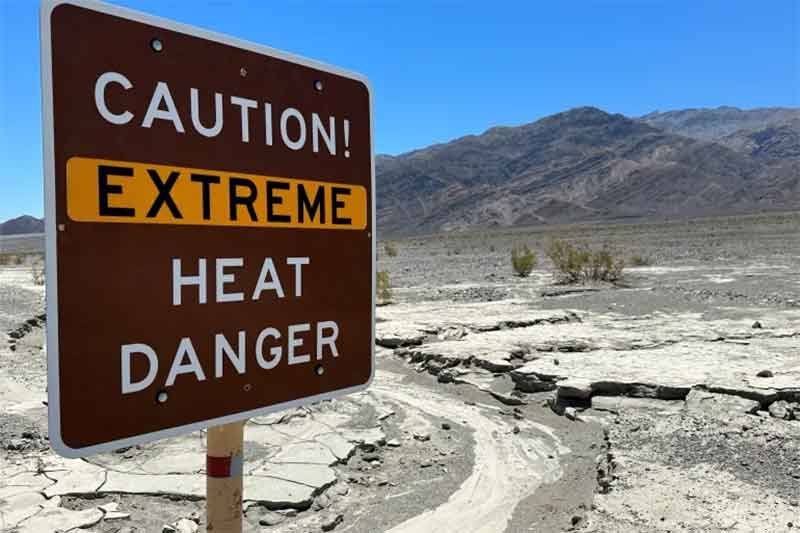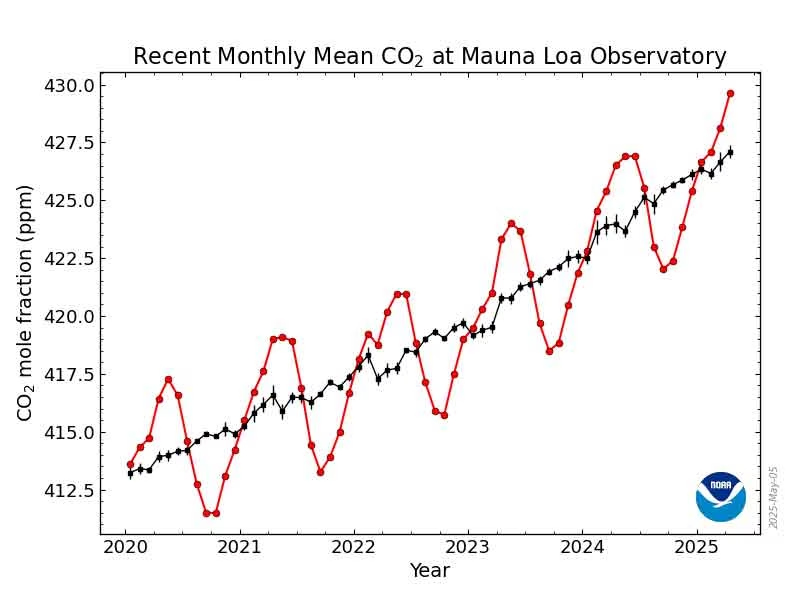
Extreme heat is one of the world’s leading killers, outdistancing worldwide conflicts of 233,000 deaths in 2024 by more than double the count at 480,000 people dead from extreme heat. All indications suggest the death count via extreme heat is headed much higher because global warming is not appreciably slowing down as global CO2 emissions in the atmosphere increase every year like clockwork, setting new record levels every year, blanketing/retaining more heat every year. It’s stifling.
Current CO2 readings at Mauna Loa Observatory, Hawaii, as of June 15th, 2025: 430.07 ppm, which is the highest daily average on record. Excessive atmospheric CO2 is the primary source of extreme heat. One needs to go back millions of years to find higher levels. In 2016, according to the Intergovernmental Panel on Climate Change (IPCC) a global body of climate scientists stated: “CO2 at 430 ppm would push the world beyond its target for avoiding dangerous climate change.” We are there!
No business or government on Earth is impacted by climate change more so than the insurance industry. It’s the biggest canary in the coal mine. Swiss Re Ltd (founded 1863) is one of the world’s largest reinsurers. The company’s 2025 SONAR Report essentially puts the world on notice that global warming has become one of the world’s biggest killers.
Swiss Re says “extreme heat,” is the designated killer, to wit: “Extreme heat events can have a large impact on human health. Recent data show that around 480, 000 deaths per year can be attributed to extreme heat events.” (Source: Extreme Heat More Deadly Than Floods, Earthquakes and Hurricanes Combined, Finds Swiss Re’s SONAR Report, Swiss Re Group, Media, Press Release, June 12, 2025)
According to Jérôme Haegeli, Swiss Re Group Chief Economist: “Extreme heat used to be considered the ‘invisible peril’ because the impacts are not as obvious as other natural perils… With a clear trend to longer, hotter heatwaves, it is important we shine a light on the true cost to human life, our economy, infrastructure, agriculture and healthcare system,” Ibid.
The SONAR 2025 Report claims extreme heat threatens industry as well as human life. For example, “the telecommunications industry faces significant risks from failing cooling systems in data centers or damage to terrestrial cables.”
Trump Administration re Extreme Heat
According to Time Magazine: What’s At Stake This Summer As Trump Targets Heat and Climate Experts, June 16, 2025: “Heat experts at the National Institute for Occupational Safety and Health (NIOSH) and the National Integrated Heat Health Information System (NIHHIS) were told in early April that their positions would be eliminated as part of the cuts made by the Trump Administration’s Department of Governmental Efficiency. The Centers for Disease Control and Prevention’s (CDC) entire environmental health unit was cut, though some jobs were restored … What was lost there is just a giant value to communities, according to V. Kelly Turner, associate professor of urban planning at University of California, Los Angeles.”
Trump does not recognize climate change as a threat to humanity, dropping out of the Paris Agreement of 2015, cutting $4 billion in prior pledges, no longer submitting carbon-cutting plans to the UN, removing electric vehicle mandates, and destroying Biden administration climate change mitigation plans while over-emphasizing and directing national attention to burning fossil fuels. These are sure-fire ways to increase the global warming hazard, in turn, leading to more severe extreme heat, thus, putting Trump in opposition to Swiss Re’s warnings about the death count of “extreme heat.”
According to the National Oceanic and Atmospheric Administration’s (NOAA) Climate Prediction Center, the entire country will see above-normal temperatures—with the only difference being in severity. Across the contiguous United States, average temperatures have already risen about 60% more than the global average since 1970 (US EPA). In due course, the American South and Southeast will feel like the Persian Gulf countries of today, where it is currently too hot to safely work outside during the day for much of the summer.
On a global basis, America’s extraordinary push for fossil fuel emissions contributes to atmospheric CO2 build up, thus impacting the world climate system by trapping more planetary heat. This direct relationship between increasing CO2 emissions and increased global warming is established scientific fact. According to WMO (World Meteorological Organization) Deputy Secretary-General Ko Barrett: “We have just experienced the ten warmest years on record. Unfortunately, this WMO report provides no sign of respite over the coming years, and this means that there will be a growing negative impact on our economies, our daily lives, our ecosystems and our planet.”
Richard Betts, head of Climate Impacts Research at the UK Met Office and a professor at the University of Exeter, May 28, 2025, informed the Associated Press. “With the next five years forecast to be more than 1.5 degrees C warmer than preindustrial levels on average, this will put more people than ever at risk of severe heat waves, bringing more deaths and severe health impacts unless people can be better protected from the effects of heat. Also, we can expect more severe wildfires as the hotter atmosphere dries out the landscape.”
Swiss Re’s SONAR Report warns the world of existential dangers of climate change by focusing, in part, on deaths caused by extreme heat, but the report goes on to suggest a threat to the entire infrastructure of economies. Swiss Re endorses policies to limit climate change, which are diametrically opposite Trump policies, to wit: Swiss Re suggests a multi-pronged approach to climate change mitigation: (1) reducing greenhouse gas (GHG) emissions (2) investing in carbon removal technologies (3) increasing climate resilience through adaptation measures (4) emphasize the importance of the Paris-aligned carbon reduction path (5) complemented by carbon removal strategies, and (6) advocate for collaboration and knowledge sharing to accelerate action.
Trump’s policies don’t jive with any, not even one, of the six suggestions by one of the world’s oldest most prestigious insurance companies. If his administration is not listening to one of the world’s leading providers of insurance coverage that’s on the front line of climate change, then who?
It’s shameful that the US government fails to recognize the most rapidly developing threat to existence, especially in the face of alarms set off by the staid insurance industry, as premiums go sky-high with claims choking the biggest players. The economy can’t handle it; homeowners can’t handle it; businesses can’t handle it. Solution: Stop burning fossil fuels oil, gas, and coal.
Subscribe to Our Newsletter
Get the latest CounterCurrents updates delivered straight to your inbox.
Robert Hunziker is a journalist from Los Angeles















































